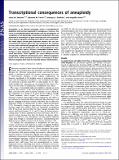Transcriptional consequences of aneuploidy
Author(s)
Sheltzer, Jason Meyer; Torres, Eduardo Martin; Dunham, Maitreya J.; Amon, Angelika B
DownloadSheltzer-2012-Transcriptional consequences of aneuploidy.pdf (1.062Mb)
PUBLISHER_POLICY
Publisher Policy
Article is made available in accordance with the publisher's policy and may be subject to US copyright law. Please refer to the publisher's site for terms of use.
Terms of use
Metadata
Show full item recordAbstract
Aneuploidy, or an aberrant karyotype, results in developmental disabilities and has been implicated in tumorigenesis. However, the causes of aneuploidy-induced phenotypes and the consequences of aneuploidy on cell physiology remain poorly understood. We have performed a metaanalysis on gene expression data from aneuploid cells in diverse organisms, including yeast, plants, mice, and humans. We found highly related gene expression patterns that are conserved between species: genes that were involved in the response to stress were consistently upregulated, and genes associated with the cell cycle and cell proliferation were downregulated in aneuploid cells. Within species, different aneuploidies induced similar changes in gene expression, independent of the specific chromosomal aberrations. Taken together, our results demonstrate that aneuploidies of different chromosomes and in different organisms impact similar cellular pathways and cause a stereotypical antiproliferative response that must be overcome before transformation.
Date issued
2012-07Department
Massachusetts Institute of Technology. Department of Biology; Koch Institute for Integrative Cancer Research at MITJournal
Proceedings of the National Academy of Sciences
Publisher
National Academy of Sciences
Citation
Sheltzer, J. M. et al. “Transcriptional Consequences of Aneuploidy.” Proceedings of the National Academy of Sciences 109.31 (2012): 12644–12649.
Version: Final published version
ISSN
0027-8424
1091-6490